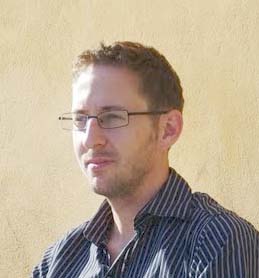Zachar István szakmai honlapja
| Tudományos fokozat: | Ph.D. | |
| Munkahely: |
Növényrendszertani, Ökológiai és Elméleti Biológiai Tanszék Budapest 1117 Pázmány Péter sétány 1/C |
|
| Beosztás: | tudományos munkatárs | |
| Telefon: | +36 1 372-2500 / 1707 | |
| Fax: | +36 1 381 2188 | |
| Email: |
 |
|
 |
||
| ResearchGate: |
 |
|
| Google Scholar: |
 |
|
| ResearcherID: | P-5101-2015 | |
| MTMT: | 10018723 | |
| StackExchange: |
 |
Kutatási területek
Prebiotika: élet keletkezése, korai templátok evolúciója, koegzisztenciája;
Evolúció: eukarióták eredete, mitokondrium eredete, sejtmag kialakulása; nagy evolúciós átmenetek (Major Evolutionary Transitions)
Kultúra: emberi nyelv eredete és korai evolúciója, kulturális evolúció, nyelvtan és szintaxis evolúciója;
Tanulás: emberi kognitív folyamatok, tanulás modellezése, insight tanulás, neurális modellek;
Szakdolgozati témák
BSc, MSc témák
-
A mitokondrium eredete: az endoszimbionta baktérium integrálódása és fennmaradása az Archaea gazdában. Ökológiai-evolúciós modellezés, különböző mitokondrium eredet-elméletek tesztelése a modellel.
-
A fagocitózis eredete ősbaktériumokban: a fagocitózis energetikája és genetikai háttere, megvalósíthatósága Archaeában. Irodalmazás, bioenergetikai adatok kutatása, ökológiai-evolúciós modellezés, biokémiai utak modellezése.
-
A prokarióta sejtváz eredete: a citoszkeleton genetikai háttere, fehérjéinek funkciói, kialakulásának ideje. Irodalmazás, genomikai és proteomikai adatok kutatása, filogenetikai analízis.
-
A nagy evolúciós átmenetek trendje: a nagy átmenetek időbeli trendjének vizsgálata és modellezése, az élet kialakulásától az eukarióta sejt megjelenésén át az emberi nyelv eredetéig. Metaanalízis, filogenetika, modellezés.
Oktatási tevékenység
Publikációk
Legfontosabb publikációk
2018 Zachar, I., Szilágyi, A., Számadó, S., & Szathmáry, E. Farming the mitochondrial ancestor as a model of endosymbiotic establishment by natural selection. Proceedings of the National Academy of Sciences, 115, E1504-E1510. doi: 10.1073/pnas.1718707115. PDF
2017 Zachar, I. & Szathmáry, E. Breath-giving cooperation: critical review of origin of mitochondria hypotheses. Biology Direct, 12(1), doi: 10.1186/s13062-017-0190-5. PDF
2017 Szilágyi, A., Zachar, I., Scheuring, I.; Kun, Á.; Könnyű, B. & Czárán, T. Ecology and evolution in the RNA World: Dynamics and stability of prebiotic replicator systems. Life, 7. doi: 10.3390/life7040048. PDF
2016 Szilágyi, A., Zachar, I., Fedor, A., de Vladar, H. P. & Szathmáry, E. Breeding novel solutions in the brain: A model of Darwinian neurodynamics. F1000Research, 5. doi: 10.12688/f1000research.9630.1.
2015 Kun, Á., Szilágyi, A., Könnyű, B., Boza, G., Zachar, I. & Szathmáry, E. The dynamics of the RNA world: insights and challenges. Annals of the New York Academy of Sciences 1341(1), 75–95. doi: 10.1111/nyas.12700. PDF
2011 Zachar, I. The feasibility of segmentation of protolanguage. Interaction Studies 12(1), 1–35. doi: 10.1075/is.12.1.01zac. PDF
2010 Zachar, I. & Szathmáry, E. A new replicator: A theoretical framework for analyzing replication. BMC Biology 8(21), 21. doi: 10.1186/1741-7007-8-21. PDF
További cikkek
2017 Fedor, A., Zachar, I., Szilágyi, A., Öllinger, M., de Vladar, H. P. & Szathmáry, E. Cognitive architecture with evolutionary dynamics solves insight problem. Frontiers in Psychology, 8(427). doi: 10.1016/j.jtbi.2015.06.047. PDF
2016 de Vladar, H. P., Fedor, A., Szilágyi, A., Zachar, I. & Szathmáry, E. An attractor network-based model with Darwinian dynamics. Proceedings of the 16th Annual Conference on Genetic and Evolutionary Computation (GECCO '16). doi: 10.1145/2908961.2931672.
2015 Vasas, V., Fernando, C., Szilágyi, A., Zachar, I., Santos, M. and Szathmáry, E. Primordial evolvability: Impasses and challenges. Journal of Theoretical Biology, 381, doi: 10.1016/j.jtbi.2015.06.047. PDF
2015 Kun, Á., Szilágyi, A., Könnyű, B., Boza, G., Zachar, I. and Szathmáry, E. The dynamics of the RNA world: insights and challenges. Annals of the New York Academy of Sciences 1341(1), 75–95. doi: 10.1111/nyas.12700. PDF
2013 Szilágyi, A., Zachar, I. and Szathmáry, E. Gause’s principle and the effect of resource partitioning on the dynamical coexistence of replicating templates. PLoS Computational Biology 9(8), e1003193. doi: 10.1371/journal.pcbi.1003193. PDF
2011 Zachar, I. The feasibility of segmentation of protolanguage. Interaction Studies 12(1), 1–35. doi: 10.1075/is.12.1.01zac. PDF
2011 Zachar, I., Fedor, A. and Szathmáry, E. Two different template replicators coexisting in the same protocell: Stochastic simulation of an extended chemoton model. PLoS ONE 6(7), e21380. doi: 10.1371/journal.pone.0021380. PDF
2010 Zachar, I. and Szathmáry, E. A new replicator: A theoretical framework for analyzing replication. BMC Biology 8(21), 21. doi: 10.1186/1741-7007-8-21. PDF
Könyvfejezetek
2013 Zachar, I., Kun, Á., Fernando, C. and Szathmáry, E. Replicators: From molecules to organism. In: Kernbach, S. (ed.) Handbook of collective robotics: Fundamentals and challenges., ch. 13. Pan Stanford Publishing, Singapore, p. 473–501. doi: 10.13140/RG.2.1.2884.3606. PDF
2007 Szathmáry, E., Szatmáry, Z., Ittzés, P., Orbán, G., Zachar, I., Huszár, F., Fedor, A., Varga, M. and Számadó, Sz. In silico evolutionary developmental neurobiology and the origin of natural language. In: Lyon, C., Nehaniv, C. L. and Cangelosi, A. (ed.) Emergence of communication and language., ch. 8. Springer-Verlag New York, Inc., New York, p. 151–187. doi: 10.1007/978-1-84628-779-4_8. PDF
Tézisek
2011 Zachar, I. Replicator Formalism. A general account of replication. PhD diplomamunka, Eötvös Loránd University, Department of Plant Systematics, Ecology and Theoretical Biology, Budapest. pp. 147. doi: 10.13140/RG.2.1.3981.5209. PDF
2004 Zachar, I. Harmadidőszaki Myliobatoideák elkülönítése [Identifying Tertiary Myliobatoids; in Hungarian]. MSc diplomamunka, Eötvös Loránd University, Department of Paleontology, Budapest. pp. 49. doi: 10.13140/10.13140/RG.2.1.2687.7520. PDF

